Baptist Health South Florida is focused on improving the health and well-being of our community, and that includes a responsibility to the environment. Our investments in sustainability initiatives support the commitment we make to provide the highest quality of care for our patients and families.
Green Today, Here Tomorrow
Healthy people depend on a healthy environment. Every action we take to improve sustainability within our organization and community circles back to that simple, yet profoundly true, statement. At Baptist Health, we are committed to supporting environmental, economic, and social resilience within our facilities, and into the communities we serve.Our Approach
Using the latest environmentally friendly measures and best practices to reduce our carbon footprint and lessen the environmental impact in our community, Baptist Health is working to reduce energy consumption and air pollution, conserve water, cut down on waste, and educate members of the communities we serve. Environmental sustainability is integral to our operations. Our sustainability approach is comprised of four pillars: Construction and Energy, Supply Chain, Clinical and Operations and Community Support.Construction and Energy Management

When West Kendall Baptist Hospital opened in 2011, the building was awarded LEED Gold certification by the U.S. Green Building Council, making it one of the first gold-certified hospitals in Florida. The hospital features white roofing products to reduce the effects of heat, high-efficiency equipment, furniture made from high-recycled content and low-emitting paints, carpets and other accessories.
Our new construction and renovation projects focus on creating efficiently run buildings that meet green conservation efforts. This includes recycling and reusing construction materials and saving trees and ponds by relocating them during construction.
Baptist Health has embarked on a multimillion-dollar project to better manage energy usage and implement changes that will enhance our environmental programs throughout South Florida. The project includes centralized control stations at each hospital. Already, efficiencies are being seen at some facilities where changes have been made.

Supply Chain
We are continuously working to source sustainable products, as well as reduce and recycle materials throughout the organization.
- Printing and Recycling Paper – From 2020 to 2021, we reduced printing by 32 percent. In 2021, we recycled approximately 100 tons of paper, which equates to 2,024 trees and 303 cubic yards of landfill space.
- Waste Management – We currently recycle more than 15 percent of collected waste. In addition, we reduced regulated medical waste by 30 percent in 2020.
- Landscaping – On our campuses, we use small electric landscaping equipment, and environmentally sensitive fertilizers, weed control and pest management. We also recycle and reuse tree clippings.
- Fleet Management – We are gradually replacing our current transport vehicles to electric vehicles and adding EV charging stations throughout our locations.

"Our commitment to environmental sustainability practices is integral to caring for our patient and families, and to the health and well-being of our community as a whole.”
Executive Vice President and Chief Financial Officer, Baptist Health South Florida
Grow2Heal
We know that good nutrition is important to overall wellness. To harness the health benefits of fresh produce, Baptist Health has developed Grow2Heal – a comprehensive program engaging Baptist Health patients, employees and our community in seeking wellness through better nutrition. Grow2Heal brings together values of sustainability, community outreach, preventative healthcare, and more equitable access to health through growing and sharing fresh produce.
Five gardens, located at Homestead Hospital, West Kendall Baptist Hospital, South Miami Hospital, Doctors Hospital, and Baptist Hospital in collaboration with Miami Cancer Institute, foster preventive health through nutrition. The gardens contribute to community building and education and provide stress relief by serving as sites for health and wellness events. By promoting sustainable agriculture, the productive green spaces also help our hospitals reduce negative environmental impacts.
The first garden was planted at Homestead Hospital in 2014 and since then has been cultivating fresh fruits and vegetables for patients, visitors, employees and local organizations in need. The garden is also the site of school field trips where children learn about nutrition and plant-based meals.
Our five Grow2Heal Gardens vary in size and in their assortment of fruits, vegetables and herbs, which include heirloom tomatoes, lettuce, carrots, eggplant, cauliflower, radishes, beets, cucumbers, bananas, passionfruit, mint, rosemary, thyme, oregano, cilantro and more.
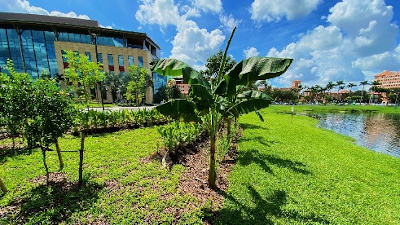
Baptist Hospital and Miami Cancer Institute
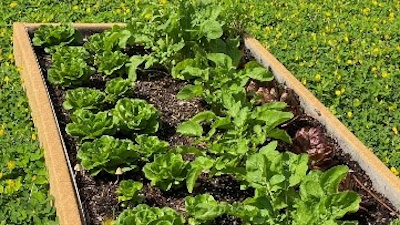
Doctors Hospital
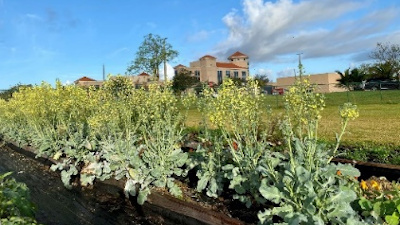
Homestead Hospital
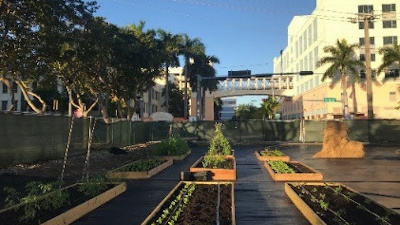
South Miami Hospital
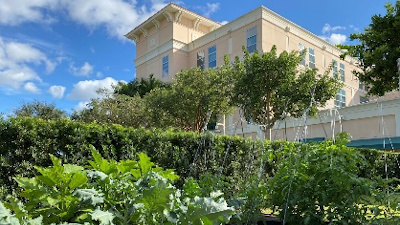
West Kendall Baptist Hospital

Connected to Our Community
Baptist Health is deeply committed to our community and proud to partner with local community groups to raise awareness about sustainability. We provide local schools and local community groups with opportunities to learn ways to embrace environmentally friendly practices and make a positive impact on their health and carbon foot print.
From volunteering time to Adopt-A-Highway clean-ups and participating in America Recycles Day to hosting our own Farmers Markets and Earth Day Fairs, our team members and community members partner to support green efforts.
Our commitment to a sustainable, resilient, and thriving community has been recognized by organizations including Sustainable Florida, U.S. Green Building Council, Dream In Green, and Practice Green Health. We’ve also partnered with Healthcare Without Harm and Cleveland Clinic Florida as the co-chairs of the Southeast Florida Health Care Resilience Collaborative to support healthcare institutions in preparing their facilities and communities for the impacts of climate change. The collaborative provides a forum for members to learn and share best practices for mitigation and resilience practices that support the health of patients and the communities we serve.
Clinical and Operations
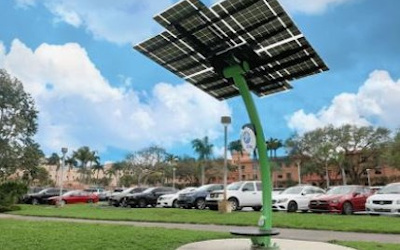
- Sourcing and purchasing high efficient equipment and systems
- Reclaiming and conserving water
- Commitment to locavore and establishing Grow2Heal gardens
- Using high-performance lighting and other fixtures
- Installing water bottle refill stations
- Designing facilities to LEED-certified standards
- Incorporating walking paths, butterfly gardens and solar trees
- Recycling supplies such as batteries, toner, paper and lightbulbs
- Making upgrades and renovations using sustainable items
- Providing environmentally friendly commuter options including public transportation programs and electric vehicle infrastructure
